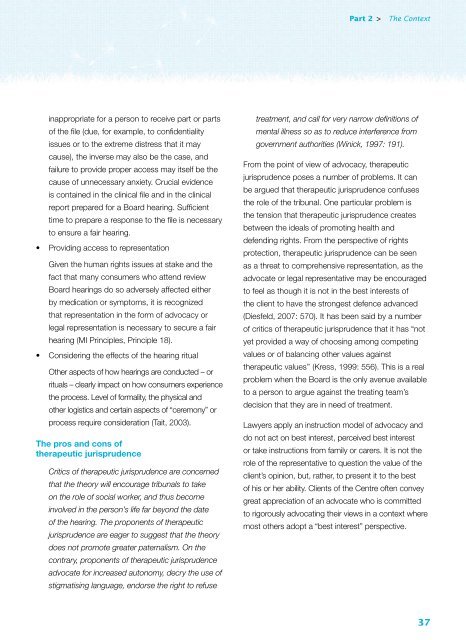Lacking Insight - Community Law
Lacking Insight - Community Law
Lacking Insight - Community Law
- No tags were found...
You also want an ePaper? Increase the reach of your titles
YUMPU automatically turns print PDFs into web optimized ePapers that Google loves.
Part 2 > The Contextinappropriate for a person to receive part or partsof the file (due, for example, to confidentialityissues or to the extreme distress that it maycause), the inverse may also be the case, andfailure to provide proper access may itself be thecause of unnecessary anxiety. Crucial evidenceis contained in the clinical file and in the clinicalreport prepared for a Board hearing. Sufficienttime to prepare a response to the file is necessaryto ensure a fair hearing.• Providing access to representationGiven the human rights issues at stake and thefact that many consumers who attend reviewBoard hearings do so adversely affected eitherby medication or symptoms, it is recognizedthat representation in the form of advocacy orlegal representation is necessary to secure a fairhearing (MI Principles, Principle 18).• Considering the effects of the hearing ritualOther aspects of how hearings are conducted – orrituals – clearly impact on how consumers experiencethe process. Level of formality, the physical andother logistics and certain aspects of “ceremony” orprocess require consideration (Tait, 2003).The pros and cons oftherapeutic jurisprudenceCritics of therapeutic jurisprudence are concernedthat the theory will encourage tribunals to takeon the role of social worker, and thus becomeinvolved in the person’s life far beyond the dateof the hearing. The proponents of therapeuticjurisprudence are eager to suggest that the theorydoes not promote greater paternalism. On thecontrary, proponents of therapeutic jurisprudenceadvocate for increased autonomy, decry the use ofstigmatising language, endorse the right to refusetreatment, and call for very narrow definitions ofmental illness so as to reduce interference fromgovernment authorities (Winick, 1997: 191).From the point of view of advocacy, therapeuticjurisprudence poses a number of problems. It canbe argued that therapeutic jurisprudence confusesthe role of the tribunal. One particular problem isthe tension that therapeutic jurisprudence createsbetween the ideals of promoting health anddefending rights. From the perspective of rightsprotection, therapeutic jurisprudence can be seenas a threat to comprehensive representation, as theadvocate or legal representative may be encouragedto feel as though it is not in the best interests ofthe client to have the strongest defence advanced(Diesfeld, 2007: 570). It has been said by a numberof critics of therapeutic jurisprudence that it has “notyet provided a way of choosing among competingvalues or of balancing other values againsttherapeutic values’’ (Kress, 1999: 556). This is a realproblem when the Board is the only avenue availableto a person to argue against the treating team’sdecision that they are in need of treatment.<strong>Law</strong>yers apply an instruction model of advocacy anddo not act on best interest, perceived best interestor take instructions from family or carers. It is not therole of the representative to question the value of theclient’s opinion, but, rather, to present it to the bestof his or her ability. Clients of the Centre often conveygreat appreciation of an advocate who is committedto rigorously advocating their views in a context wheremost others adopt a “best interest” perspective.37
















